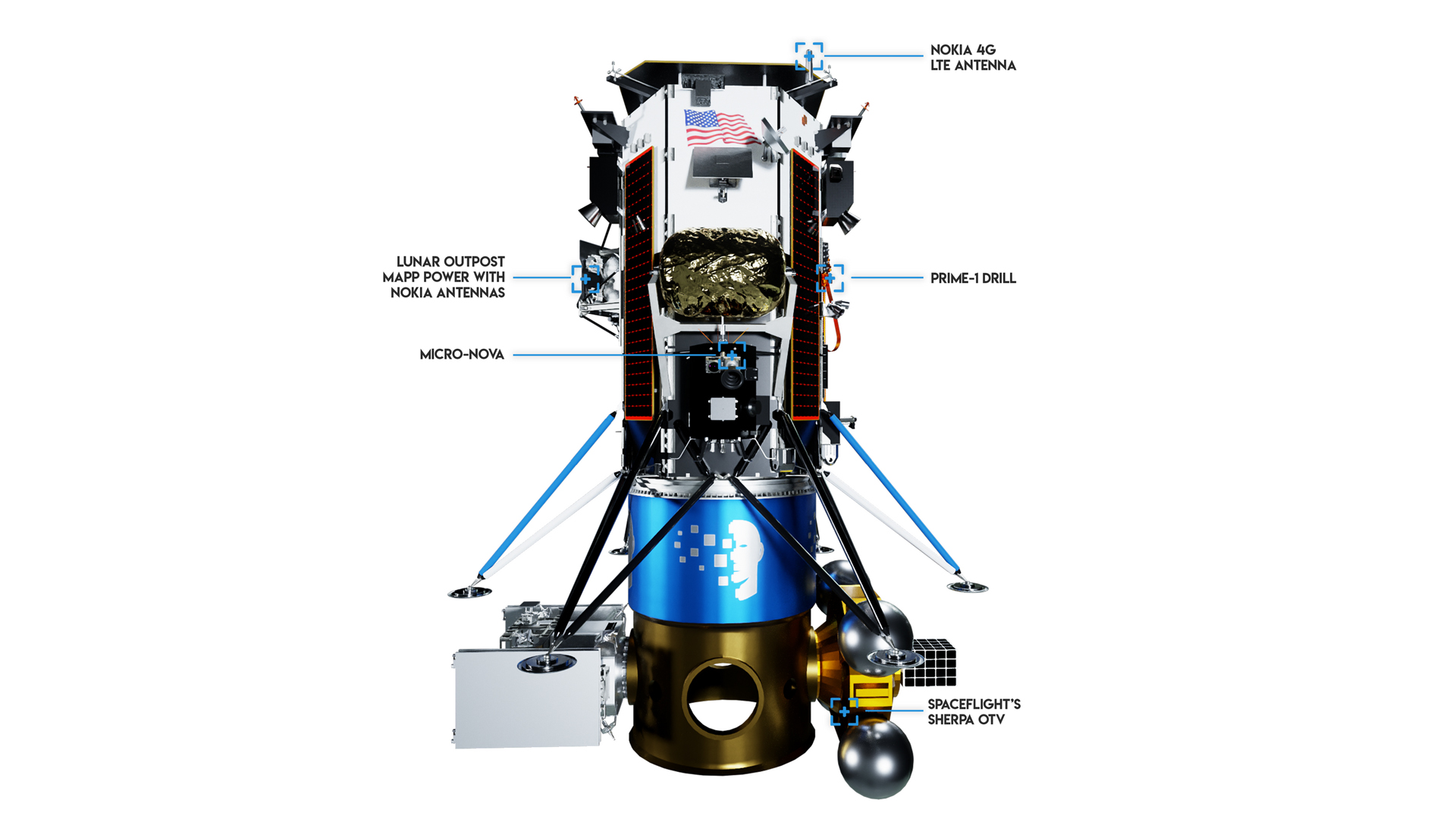Spaceflight Inc. unveils rideshare payloads for lunar flyby on private moon lander mission in 2022
Spaceflight's lunar flyby mission will hitch a ride with Intuitive Machines' moon lander next year.

Breaking space news, the latest updates on rocket launches, skywatching events and more!
You are now subscribed
Your newsletter sign-up was successful
Want to add more newsletters?

Delivered daily
Daily Newsletter
Breaking space news, the latest updates on rocket launches, skywatching events and more!

Once a month
Watch This Space
Sign up to our monthly entertainment newsletter to keep up with all our coverage of the latest sci-fi and space movies, tv shows, games and books.

Once a week
Night Sky This Week
Discover this week's must-see night sky events, moon phases, and stunning astrophotos. Sign up for our skywatching newsletter and explore the universe with us!

Twice a month
Strange New Words
Space.com's Sci-Fi Reader's Club. Read a sci-fi short story every month and join a virtual community of fellow science fiction fans!
We now know which companies hitch a ride to the moon with Spaceflight Inc. as part of a robotic lunar landing mission by Intuitive Machines in 2022.
While the Intuitive Machines Nova C-lander is en route to the moon during its mission, slated to launch in late 2022, a rideshare from Spaceflight Inc. will deliver a payload from a new company called GeoJump, Spaceflight said in an announcement today (Sept. 14). (The rideshare with Spaceflight was announced Aug. 18, but the names of the participating companies were only just disclosed.)
GeoJump is a new company offering its own rideshare opportunity within Spaceflight's rideshare, it appears. According to Spaceflight, the GeoJump payload will also be joined by an Orbit Fab in-space fueling payload.
Orbit Fab previously received funding from Lockheed Martin and Northrop Grumman to test in-orbit refueling in space; the technology is still in its infancy and may prove useful to drive down the cost of lunar missions.
Related: NASA picks 3 new science experiments for commercial moon missions
Orbit Fab's payload will be delivered into a lunar flyby pathway using Spaceflight's Sherpa-ES, an orbital transfer vehicle meant to place satellites in cislunar space (meaning, the area nearby the moon.) Spaceflight Inc. has already tested several Sherpa vehicles in Earth orbit since 2018.
"This mission will demonstrate our complete mission toolbox and ability to execute complex, groundbreaking and exciting missions beyond LEO [low Earth orbit]," Grant Bonin, Spaceflight's senior vice-president of business development, said in the statement.
Breaking space news, the latest updates on rocket launches, skywatching events and more!
The newly announced companies will piggy on to a moon landing mission funded through NASA's Commercial Lunar Payload Services (CLPS) program. The agency selected Intuitive Machines, along with Astrobotic and Orbit Beyond, in May 2019 to deliver science experiments and technology demonstrations to the moon.
In October 2020, NASA further announced it would award Intuitive Machines $47 million to place a water-measuring payload on the moon's south pole in 2022, called Polar Resources Ice Mining Experiment (PRIME-1). In August 2021, Intuitive announced it would launch its mission aboard a SpaceX Falcon 9 rocket.
CLPS is meant to service the space agency's Artemis program that aims to put human boots on the surface around 2024, although some technical and funding obstacles and an interruption to Artemis' human landing system contract due to a lawsuit may push the landing back.
Follow Elizabeth Howell on Twitter @howellspace. Follow us on Twitter @Spacedotcom and on Facebook.

Elizabeth Howell (she/her), Ph.D., was a staff writer in the spaceflight channel between 2022 and 2024 specializing in Canadian space news. She was contributing writer for Space.com for 10 years from 2012 to 2024. Elizabeth's reporting includes multiple exclusives with the White House, leading world coverage about a lost-and-found space tomato on the International Space Station, witnessing five human spaceflight launches on two continents, flying parabolic, working inside a spacesuit, and participating in a simulated Mars mission. Her latest book, "Why Am I Taller?" (ECW Press, 2022) is co-written with astronaut Dave Williams.
